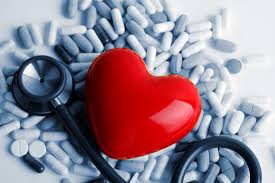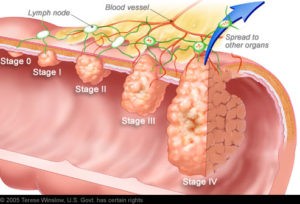“Here, we summarize the potential cardiovascular toxicities for a range of cancer chemotherapeutic and chemopreventive agents and emphasize…”
Hi David-I had emergency surgery on January 19, to remove a 5 cm tumor from my colon. Two of 43 lymph nodes tested positive for cancer.
An upper and lower CT scan showed that the cancer had not spread to my other organs.
I was born with a defective heart valve. In December, 2004, I got endocarditis and had surgery to receive a metal heart valve. As a result, I now have to take warfarin blood thinner.
The standard treatment for my cancer is FOLFOX or Capecitabine or 5-FU/leucovorin. How will these drugs affect my heart condition? Do you know of any successful alternative treatments to rid my body of cancer other than chemotherapy?
Hi Lola-
Let me begin by saying two things. First, I am sorry to read of your colon cancer diagnosis. Second let me say that I think “Lola” is a great name.
You may or may not need local radiation if you are IIIB. To say this more specifically, local radiation may or may not improve your survival according to research.
According to the article linked above your survival rate is over 64%. Please understand that this survival rate includes ONLY those patients who undergo the standard chemotherapy fully. This is your challenge.
“The five-year survival rate for stage III colon cancer is about 64%. Patients with one to four positive lymph nodes have a higher survival rate than people with more than five positive lymph nodes.”
As you have figured out, it is your heart that is going to be a challenge if you undergo the standard therapy regimen.
- Folfox,
- Capcitabine and or
- 5-FU/leucovorin
According to research, all are toxic and may be “cardio-toxic” chemotherapy regimens.
I know of no alternative treatments that can cure a colon cancer diagnosed at stage IIIB. However I do know of evidence-based (well researched) therapies that work “integratively” with the chemotherapies mentioned above.
Just as important, several nutritional supplements have been shown to reduce or prevent
Lola, I sustained heart damage during my own chemotherapy in 1995-6. I developed chronic a-fib in the fall of 2010. I currently take several supplements that strengthen my heart function. I live pretty normally with my a-fib.
My point is that it is my belief that you need to undergo the standard chemotherapy and at the same time supplement with Integrative therapies to enhance the efficacy while reducing the toxicity of the chemotherapy you are taking. After your chemotherapy I think you should take those same supplements that I take.
I am not a medical doctor. I am not an oncologist. I am a long-term cancer survivor who has researched
- Integrative
- Complementary
- Alternative
therapies to shown to manage cancer and life with chemo-induced side effects.
Take it easy,
David Emerson
- Cancer Survivor
- Cancer Coach
- Director PeopleBeatingCancer
“Due to the aging of the populations of developed countries and a common occurrence of risk factors, it is increasingly probable that a patient may have both cancer and cardiovascular disease. In addition, cytotoxic agents and targeted therapies used to treat cancer, including classic chemotherapeutic agents, monoclonal antibodies that target tyrosine kinase receptors, small molecule tyrosine kinase inhibitors, and even antiangiogenic drugs and chemoprevention agents such as cyclooxygenase-2 inhibitors, all affect the cardiovascular system.
One of the reasons is that many agents reach targets in the microenvironment and do not affect only the tumor. Combination therapy often amplifies cardiotoxicity, and radiotherapy can also cause heart problems, particularly when combined with chemotherapy. In the past, cardiotoxic risk was less evident, but it is increasingly an issue, particularly with combination therapy and adjuvant therapy.
Today’s oncologists must be fully aware of cardiovascular risks to avoid or prevent adverse cardiovascular effects, and cardiologists must now be ready to assist oncologists by performing evaluations relevant to the choice of therapy. There is a need for cooperation between these two areas and for the development of a novel discipline, which could be termed cardio-oncology or onco-cardiology.
Here, we summarize the potential cardiovascular toxicities for a range of cancer chemotherapeutic and chemopreventive agents and emphasize the importance of evaluating cardiovascular risk when patients enter into trials and the need to develop guidelines that include collateral effects on the cardiovascular system. We also discuss mechanistic pathways and describe several potential protective agents that could be administered to patients with occult or overt risk for cardiovascular complications…”





